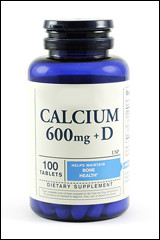Link between calcium supplements and heart disease raises the question: Take them or toss them?

Here we go again. First it was vitamin E. Then it was beta carotene. Now calcium supplements are being called on the carpet after researchers claimed they may do more harm than good.
The flap comes in the wake of a German study that found a significantly increased risk of heart attack among women taking calcium supplements, but not among those who got their calcium from food. The study appears in the June 2012 issue of the journal Heart.
Since calcium supplements are recommended to prevent osteoporosis for virtually everyone over age 50, this leaves millions of people wondering whether they should ditch their daily calcium pills. Three Harvard professors weigh in on the issue.
Calcium and the heart
Over time, calcium can accumulate in arteries. It makes them stiffer and less responsive to the demands of the body. Rigid arteries contribute to high blood pressure, angina (chest pain with exertion or stress), and heart failure. Calcium also builds up in plaque, the cholesterol-filled pockets that grow inside arteries like tiny pimples. By narrowing arteries, plaque can choke off the supply of blood to heart muscle and other vital tissues. If a plaque bursts open, it can trigger a heart attack, stroke, or sudden cardiac arrest.
What researchers don’t know is whether this process is influenced by the amount of calcium a person takes in each day from supplements.
Supplements are okay…for now
A decision to stop taking calcium supplements should not be made on this study, says Dr. Deepak Bhatt, a cardiologist at Harvard-affiliated Brigham and Women’s Hospital.
“The study did not provide iron-clad evidence of a connection between calcium supplements and heart attack. Although it’s not the first report suggesting this connection, no study has definitely proven that excessive calcium intake contributes to plaque formation and heart disease,” Dr. Bhatt told me.
He questions the researchers’ explanation that excess calcium is deposited in the arteries, because the bones have limited ability to absorb calcium given in larger doses than found in foods. “We know that calcium in plaque is a response to injury, an effort to wall off an area of the artery that has been damaged by cholesterol or smoking, for example. It can happen in people whose calcium levels are in the normal range,” he says.
Dietary calcium is important, as it helps to build strong bones and keep them healthy. That’s why Dr. Bhatt would support people who, on their doctor’s advice, get some of the recommended 1,000 to 1,200 milligrams of calcium a day through supplements because they can’t get that amount from food.
“It’s perfectly reasonable to stick with these recommendations regarding calcium intake for now,” he says.
Calcium-rich foods are better
Dr. Richard Lee, co-editor of the Harvard Heart Letter and a cardiologist who specializes in finding new approaches to treating cardiovascular diseases, is more cautious. Because calcium supplements have not been proven safe without a doubt, and most people can get enough calcium through diet, he suggests that people try to get their daily allowance of this mineral from food.
“I don’t think people should take calcium supplements unless they understand there may be a heart hazard that appears in the future. When people really pin me down, I tell them to take a once-a-day multivitamin and eat a balanced diet. That is plenty for almost everyone,” he says.
Supplements are just that
Dr. David Slovik, an osteoporosis specialist at Massachusetts General Hospital, agrees with Dr. Bhatt that the research connecting calcium supplements with heart attack does not provide enough clarity to challenge current recommendations.
He suggests people not rely on supplements as their primary source of calcium.
“I tell my patients to try to get as much calcium from food as possible. They should also exercise and take vitamin D to help maximize and maintain their bone strength,” he says.
About the Author
Holly Strawbridge, Former Editor, Harvard Health
Disclaimer:
As a service to our readers, Harvard Health Publishing provides access to our library of archived content. Please note the date of last review or update on all articles.
No content on this site, regardless of date, should ever be used as a substitute for direct medical advice from your doctor or other qualified clinician.















